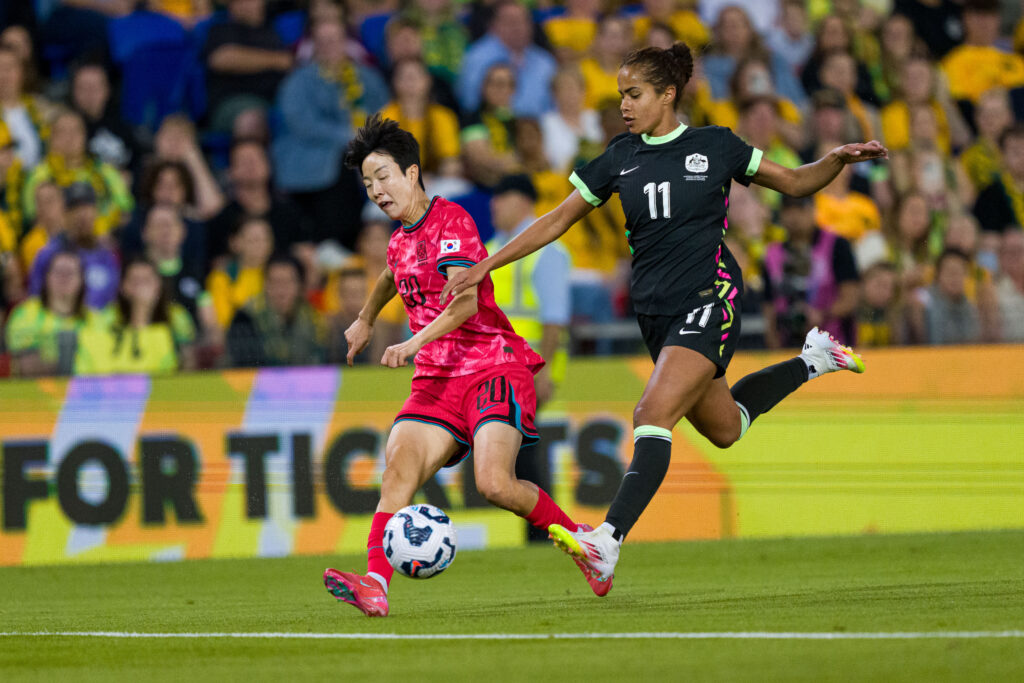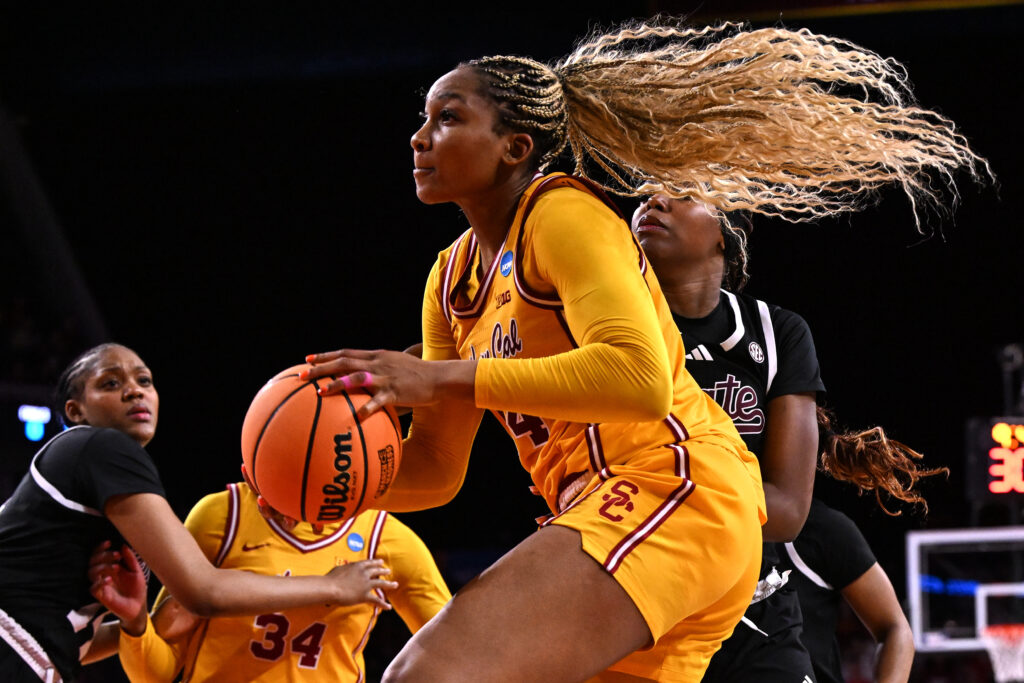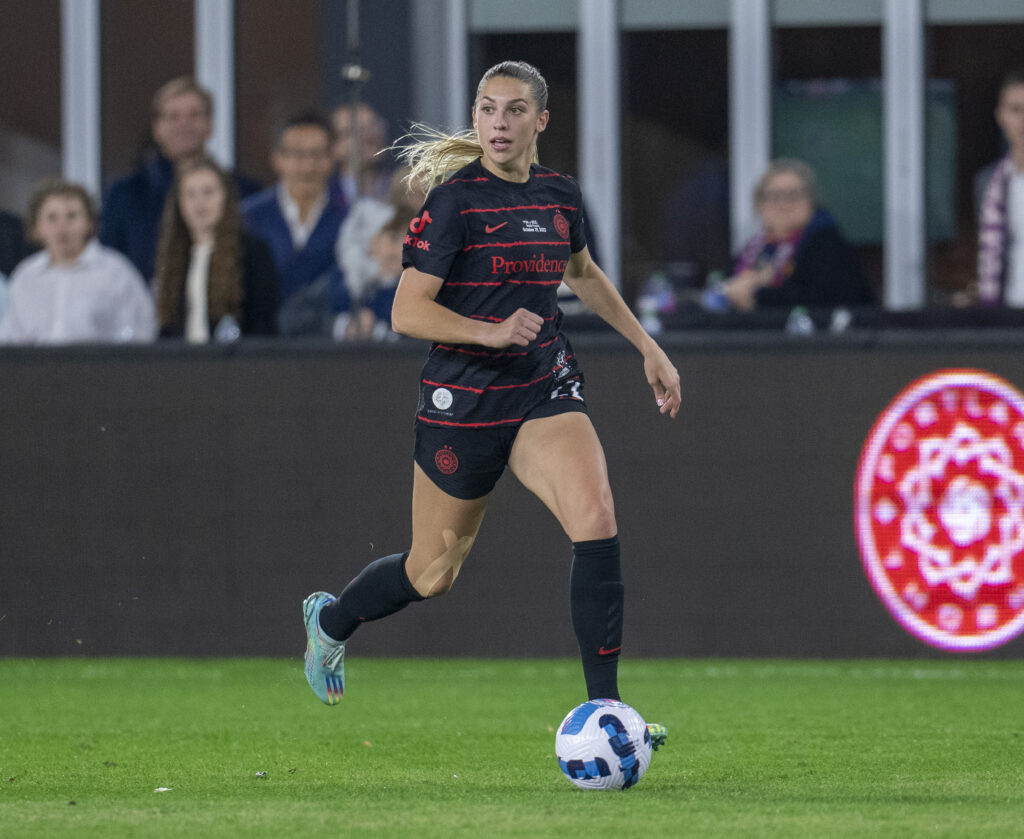Australia and Manchester City forward Mary Fowler exited last Sunday’s FA Cup semifinal with a confirmed ACL injury, cutting short what had been a promising season for the young international star.
“Mary will remain under the care of the club’s medical team and start her rehabilitation,” City said after the team’s 2-0 loss to crosstown rivals Manchester United.
“It’s never easy when something like this happens, especially when you’ve been working so hard and feeling good,” Fowler added.
Fowler scored six goals in 17 WSL appearances for Manchester City this season, coupled with a league-leading seven assists. She joined City in 2022 from French side Montpellier, signing a four-year contract with the English team.
The news adds to City’s mounting injury tally, as the fourth-place team enters the UK league’s home stretch with Vivianne Miedema, Bunny Shaw, and Alex Greenwood on the sidelines. Additional unavailable players include Jill Roord, Laura Blindkilde-Brown, Aoba Fujino, Rebecca Knaak, and Lauren Hemp.

Fowler injury leaves 2026 Asian Cup fitness in question
Fowler's recent ACL tear has broader implications than club play.
Australia is set to host 2026 Asian Cup, with the 22-year-old striker expected to lead the Matildas' frontline at the tournament. However, with a lengthy rehabilitation process ahead, Fowler might not be available to represent her country when the Asian Cup kicks off next March.
“This is tough news for Mary and for all of us who know the dedication and passion she brings to her craft,” Matildas interim head coach Tom Sermanni said in a national team statement. “She’s an exceptional talent and a much-loved member of our team, and we know she’ll meet this challenge with the same courage she brings to the pitch.”
“Everyone in the Matildas and Football Australia family – players, coaches, and support staff – will be right behind Mary as she takes the first steps toward her comeback,” he continued.
Fowler debuted for Australia's national team in 2018. She went on to score 16 goals over 64 appearances.
USC star sophomore JuJu Watkins suffered a serious injury in the No. 1-seed Trojans’ second-round March Madness win over No. 9-seed Mississippi State on Monday, putting a dismal stamp on the final day of the 2024/25 NCAA tournament's first weekend.
After taking contact from two defenders midway through the first quarter, a visibly distraught Watkins crumbled to the court with a season-ending ACL tear in her right knee. The season's second-leading Division I scorer will soon undergo surgery before beginning rehabilitation.
"I'd be lying if I told you I wasn’t rattled seeing JuJu lying on the floor and crying," said USC head coach Lindsay Gottlieb afterwards. "This is a human game, so I obviously tried my best to be what I need to be for the team, but internally it’s a lot."
The arena mirrored Gottlieb's reaction, a testament to Watkins's impact on the USC community.
"You cannot tell me the energy of that crowd, and how sort of angry they were with the other team, and how much fire they showed for our team, is so much about what JuJu has given to this arena, to this program, to the city," added Gottlieb. "And you just want to give it all back."
A National Player of the Year frontrunner, Watkins’s injury will reverberate throughout USC’s tournament run, as the Trojans stare down a potential Elite Eight rematch with surging No. 2-seed UConn.

Trojans step up after Watkins injury
After seeing their teammate carried off the court, USC regrouped in a big way, converting their early 13-2 lead into a 96-59 blowout victory over the Bulldogs to clinch a spot in the Sweet 16.
In light of the Watkins injury, star transfer forward Kiki Iriafen took charge, putting up a season-high 36 points and nearly notching a double-double by adding nine rebounds to her stat sheet.
Also taking up Watkins' mantle were a pair of freshmen guards, Avery Howell and Kayleigh Heckel, who came off the bench to add 18 and 13 points, respectively.
The added emotional tenacity the Trojans displayed was not lost on Gottlieb, who thanked her team in a post-game locker room address.
"I will never forget this game for as long as I live," the USC coach told her players. "You guys did something really special today."
"I have to say it with a calm face and tell you how incredibly proud I am of the way you stepped up for one another...it was a tidal wave of a team."
Top NCAA tournament seeds dominate Sweet 16 berths
Ultimately, losing Watkins is a devastating blow not just to USC, but to college basketball at large, radically reshaping the competitive landscape as March Madness gears up for next weekend's Sweet 16 round.
Monday's final buzzer officially set that field, locking in every team seeded No. 3 and above, plus one No. 4 seed and a trio of No. 5 seeds.
In a day void of upsets, seven of Monday's games averaged a wide 28-point margin of victory. The lone outlier was Maryland's bombshell victory, as the Terps booked their Sweet 16 spot in an instant classic game against No. 5-seed Alabama.
After the Terrapins rallied from a 17-point third-quarter deficit to push the game into overtime, Tide fifth-year guard Sarah Ashlee Barker forced double-overtime with a trio of free throws.
Though the Terps ultimately emerged with the 111-108 victory, Barker set records, notching a career-high 45 points — the most by any SEC athlete and the fourth-most by any Division I player in March Madness history.
"It didn't go our way but, at the end of the day, I'm gonna walk out and hold [my] head high," said Barker about the game that capped her NCAA career. "If you're a women's basketball fan, or anybody that loves basketball, I think that every single person could say that that was one of the best games they've ever watched."
With games between the NCAA's best stacking next weekend's Sweet 16 slate, this year's March Madness tournament is could see even more blockbuster clashes.
Chelsea FC listed star striker Sam Kerr on next week’s 25-player Champions League quarterfinal squad, with manager Sonia Bompastor confirming the UK team's roster move on Thursday.
After 15 months off the pitch, the 31-year-old Australia national team captain is nearing the end of a long road back from a January 2024 ACL tear, recently re-joining training sessions with the Blues.
Even so, Bompastor said it will be difficult to predict when Kerr will be able to make an official return to the pitch.
Kerr's inclusion on Chelsea's Champions League team is partially due to UEFA guidelines, which require the competition's quarterfinalists to lock in their rosters for the contest's next three rounds — which won't wrap up until the May 25th final.
Chelsea is banking on Kerr being available sometime before the close of the European tournament, though Bompastor's recent comments seem to be tempering expectations that the attacker will return for this month's quarterfinals.
"Sometimes even if you have high expectations, it doesn’t go the way you want," Bompastor told reporters on Thursday. "If we have positive news and she can bring into the team her experience, but also her competencies, it will be great."
While the WSL-leaders are hopeful to see Kerr on the UWCL pitch, the Australian's inclusion means that Chelsea left USWNT prospect Mia Fishel off of the Champions League roster. The 23-year-old is continuing her own recovery from an ACL tear, which she suffered mere weeks after Kerr's injury.
Ultimately, the Blues are aiming to return both standout players sooner rather than later, with Bompastor focusing on her athletes' individual journeys.
"I just want [Kerr] to feel like the main focus for her will be to work really hard, be the best version of herself," the Chelsea boss said.
How to watch Chelsea in the Champions League quarterfinals
While the 2024/25 UEFA Champions League quarterfinals begin on Tuesday, March 18th, Chelsea will kick off their two-leg contest against fellow WSL side Manchester City at 4 PM ET on Wednesday, March 19th, with the pair's second UWCL match set for the same time on Thursday, March 27th.
All UWCL matches stream live on DAZN.
As the 2025 NWSL season nears, clubs are already racking up serious injuries with both preseason training and the concurrent FIFA international break now underway.
Portland announced a trio of roster losses on Wednesday, naming forward Morgan Weaver, defender Nicole Payne, and defender Marie Müller to the season-ending injury list.
Regional rival Seattle also made a tough announcement, sharing that veteran forward Veronica Latsko suffered a season-ending Achilles tear during the second half of the Reign's 1-0 preseason win over Bay FC at the Coachella Valley Invitational on February 16th.
"We’re absolutely gutted for Veronica," said Reign head coach Laura Harvey in the team's statement. "She has proven over her career to be resilient, diligent and hard working on the pitch, we know how much preparation she had put in for this season."
"While this is a tough setback, we have no doubt she’ll attack her recovery with the same determination and resilience she brings to the pitch every day. Our entire club will be behind her every step of the way."

Research gap persists as athletes continue suffering injuries
Injuries can be difficult to avoid as players ramp up their fitness ahead of the NWSL's March 14th Kickoff weekend, especially as athletes balance heavy workloads with the lack of preventative injury research specific to women.
Payne and Müller both went down with right ACL tears — Payne during the Thorns' 2-1 preseason loss to Angel City on February 16th and Müller while in training camp with Germany on February 19th — an all-too-common occurrence in among women’s footballers.
Weaver also suffered a preseason right knee knock in January, re-injuring the same knee she had surgery on last May.
All in all, while injuries are a part of the game, the sport's growing professionalization has exposed a gap in research and resources — particularly on the women’s pitch. As parity continues to rise worldwide, fending off another injury epidemic continues to be front of mind for both players and staff.
On Tuesday, FIFPRO announced the launch of Project ACL, a three-year research initiative designed to address a steep uptick in ACL injuries across women's professional football.
Project ACL is a joint venture between FIFPRO, England’s Professional Footballers’ Association (PFA), Nike, and Leeds Beckett University. While the central case study will focus on England’s top-flight Women's Super League, the findings will be distributed around the world.
ACL tears are between two- and six-times more likely to occur in women footballers than men, according to The Guardian. And with both domestic and international programming on the rise for the women’s game, we’ve seen some of the sport's biggest names moved to the season-ending injury list with ACL-related knocks.
Soccer superstars like Vivianne Miedema, Beth Mead, Catarina Macario, Marta, and England captain Leah Williamson have all struggled with their ACLs in recent years, though all have since returned to the field. In January, Chelsea and Australia forward Sam Kerr was herself sidelined with the injury, kicking off a year of similar cases across women’s professional leagues. And just yesterday, the Spirit announced defender Anna Heilferty would miss the rest of the NWSL season with a torn ACL. The news comes less than two weeks after Bay FC captain Alex Loera went down with the same injury.
Project ACL will closely study players in the WSL, monitoring travel, training, and recovery practices to look for trends that could be used to prevent the injury in the future. Availability of sports science and medical resources within individual clubs will be taken into account throughout the process.
ACL injuries in women's football have long outpaced the same injury in the men's game, but resources for specialized prevention and treatment still lag behind. Investment in achieving a deeper, more specialized understanding of the problem should hopefully alleviate the issue both on and off the field.
Janine Beckie is one of many players who won’t compete at the 2023 Women’s World Cup as the result of an ACL tear. The Olympic gold medalist for Canada tore her right ACL last month while playing in an NWSL preseason game for the Portland Thorns.
It isn’t news that women’s soccer players are more likely to tear an ACL than their male counterparts. Studies have found that women are up to six times more likely to sustain the injury. But Beckie doesn’t want that stat to become normalized.
“I think that a lot of people have boiled it down for so long to ‘Oh, it’s just more common in women, and a common injury in women’s soccer.’ but it seems like there’s been this massive jump in the amount that it’s happening now. I don’t know what the reason is but someone needs to figure it out,” Beckie told Reuters.
The 28-year-old forward called for more resources for the women as the number of games on the calendar increases.
“You’ve changed the schedule to mimic the men yet you’re not giving the female players the same level of resources,” she said. “Premier League players are playing 40-, 50-plus games a season and are able to maintain fitness levels because they’re treated like gold, which they should be. If you’re going ask an elite athlete to play 50 games a season, you’ve got provide them the top-of-the-line care.”
Beckie isn’t the only sidelined player calling for action.
“I think it’s way too common in the women’s game,” England national Beth Mead recently told FIFPro.
“I think if that had happened in the men’s game, a lot more would have been done sooner. It’s important for us to drive the different factors and aspects around why it’s happening so often.”